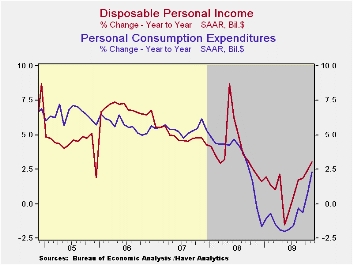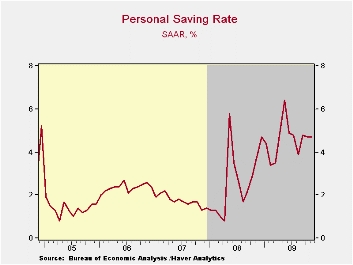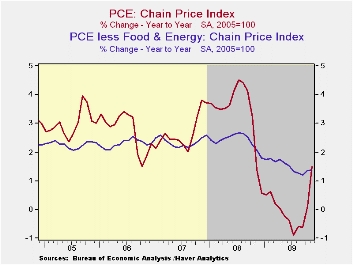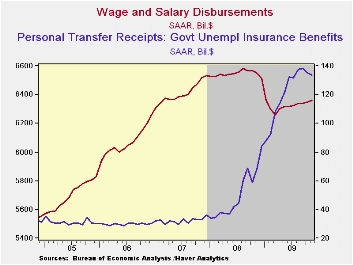 Global| Dec 23 2009
Global| Dec 23 2009U.S. Disposable Personal Income & Spending Continue Firm
by:Tom Moeller
|in:Economy in Brief
Summary
Tax breaks continued to spur growth in disposable personal income. Last month's 0.5% gain followed an upwardly revised 0.5% October increase. A decline in tax payments (-25.7% y/y), which began early in 2008, helped spur y/y [...]
 Tax breaks
continued to spur growth in disposable personal income.
Last month's 0.5% gain followed an upwardly revised 0.5% October
increase. A decline in tax payments (-25.7% y/y), which began early in
2008, helped spur y/y disposable income growth to 3.1%. Adjusted for a
0.2% (1.5% y/y) rise in the chain price index, real disposable income
rose 0.2% (1.5% y/y) for the third consecutive month.
Tax breaks
continued to spur growth in disposable personal income.
Last month's 0.5% gain followed an upwardly revised 0.5% October
increase. A decline in tax payments (-25.7% y/y), which began early in
2008, helped spur y/y disposable income growth to 3.1%. Adjusted for a
0.2% (1.5% y/y) rise in the chain price index, real disposable income
rose 0.2% (1.5% y/y) for the third consecutive month.
 Personal
spending rose 0.5% after a 0.6% October increase which was
double the initial estimate. The rise fell short of the 0.7% increase
which was the Consensus expectation. Durables spending jumped 1.1%
(2.5% y/y) as spending on motor vehicles gained another 2.2% (7.9% y/y)
following a 9.5% October surge. Spending on other durables, however,
remained lackluster. Furniture & appliance purchases fell
slightly for the second month and were off 2.9% y/y. Spending on
nondurables increased 1.5% (4.6% y/y) as outlays on gasoline jumped
7.2% (18.6% y/y) with higher prices. In constant dollars gasoline
outlays rose just 0.9% and were down slightly y/y. Spending on clothing
slipped 0.3% (-1.1% y/y) though that y/y change is improved from 6.8%
decline at the worst of the recent recession. Outlays on services were
unchanged (1.5% y/y). Spending on health care rose 0.4% (4.8% y/y) but
housing & utilities spending fell 0.4% (+0.2% y/y).
Personal
spending rose 0.5% after a 0.6% October increase which was
double the initial estimate. The rise fell short of the 0.7% increase
which was the Consensus expectation. Durables spending jumped 1.1%
(2.5% y/y) as spending on motor vehicles gained another 2.2% (7.9% y/y)
following a 9.5% October surge. Spending on other durables, however,
remained lackluster. Furniture & appliance purchases fell
slightly for the second month and were off 2.9% y/y. Spending on
nondurables increased 1.5% (4.6% y/y) as outlays on gasoline jumped
7.2% (18.6% y/y) with higher prices. In constant dollars gasoline
outlays rose just 0.9% and were down slightly y/y. Spending on clothing
slipped 0.3% (-1.1% y/y) though that y/y change is improved from 6.8%
decline at the worst of the recent recession. Outlays on services were
unchanged (1.5% y/y). Spending on health care rose 0.4% (4.8% y/y) but
housing & utilities spending fell 0.4% (+0.2% y/y).
As a result of tax cuts and moderate spending, the savings rate held steady at the upwardly revised 4.7% October level. The rate has risen sharply from near 1.0% at the beginning of last year.
 Overall personal
income gained 0.4% during November after an upwardly revised
0.3% October increase. The latest figure fell short of Consensus
expectations for a 0.5% rise. Wages & salaries rose 0.3% due to
the pickup in average hourly earnings reported with the jobs numbers.
Nevertheless, year-to-year growth in wages continued negative (-2.8%
y/y), only slightly improved from the worst y/y growth of this cycle.
Wages in the factory sector rose 0.2% (-10.4% y/y) after a 0.4% October
decline. In the service sector wages rose a firmer 0.4% (-1.7% y/y).
Though wages in the government sector only ticked up 0.1% last month,
the 2.9% y/y gain easily outpaced the 4.1% decline in private sector
earnings.
Overall personal
income gained 0.4% during November after an upwardly revised
0.3% October increase. The latest figure fell short of Consensus
expectations for a 0.5% rise. Wages & salaries rose 0.3% due to
the pickup in average hourly earnings reported with the jobs numbers.
Nevertheless, year-to-year growth in wages continued negative (-2.8%
y/y), only slightly improved from the worst y/y growth of this cycle.
Wages in the factory sector rose 0.2% (-10.4% y/y) after a 0.4% October
decline. In the service sector wages rose a firmer 0.4% (-1.7% y/y).
Though wages in the government sector only ticked up 0.1% last month,
the 2.9% y/y gain easily outpaced the 4.1% decline in private sector
earnings.
 Growth in
unemployment insurance payments slowed
further as joblessness fell. In fact, moderate declines during the last
two months compare with the y/y doubling earlier this year. Interest
income rose 0.2% (-4.6% y/y) as the decline in rates found a bottom
while another 0.9% m/m increase in dividend income
nevertheless left it down 18.0% y/y with the weaker economy.
Growth in
unemployment insurance payments slowed
further as joblessness fell. In fact, moderate declines during the last
two months compare with the y/y doubling earlier this year. Interest
income rose 0.2% (-4.6% y/y) as the decline in rates found a bottom
while another 0.9% m/m increase in dividend income
nevertheless left it down 18.0% y/y with the weaker economy.
The PCE chain price index increased a moderate 0.2% during November led by a 6.2% (18,5% y/y) increase in gasoline costs. Less food-and-energy, "core" prices were unchanged. Prices for durable goods were off 0.1% (-1.1% y/y) as home furnishing prices fell 0.5% (-2.1% y/y) and apparel prices also fell 0.5% (+0.8% y/y). Prices for services gained a steady 1.2% y/y.
The personal income & consumption figures are available in Haver's USECON and USNA databases.
| Disposition of Personal Income (%) | November | October | September | Y/Y | 2008 | 2007 |
|---|---|---|---|---|---|---|
| Personal Income | 0.4 | 0.3 | 0.3 | -0.3 | 2.9 | 5.6 |
| Disposable Personal Income | 0.5 | 0.5 | 0.3 | 3.1 | 3.9 | 4.9 |
| Personal Consumption Expenditures | 0.5 | 0.6 | -0.6 | 2.3 | 3.1 | 5.4 |
| Saving Rate | 4.7 | 4.7 | 4.8 | 3.8 (Nov.'08) | 2.6 | 1.7 |
| PCE Chain Price Index | 0.2 | 0.3 | 0.1 | 1.5 | 3.3 | 2.7 |
| Less food & energy | 0.0 | 0.2 | 0.1 | 1.4 | 2.4 | 2.4 |
Tom Moeller
AuthorMore in Author Profile »Prior to joining Haver Analytics in 2000, Mr. Moeller worked as the Economist at Chancellor Capital Management from 1985 to 1999. There, he developed comprehensive economic forecasts and interpreted economic data for equity and fixed income portfolio managers. Also at Chancellor, Mr. Moeller worked as an equity analyst and was responsible for researching and rating companies in the economically sensitive automobile and housing industries for investment in Chancellor’s equity portfolio. Prior to joining Chancellor, Mr. Moeller was an Economist at Citibank from 1979 to 1984. He also analyzed pricing behavior in the metals industry for the Council on Wage and Price Stability in Washington, D.C. In 1999, Mr. Moeller received the award for most accurate forecast from the Forecasters' Club of New York. From 1990 to 1992 he was President of the New York Association for Business Economists. Mr. Moeller earned an M.B.A. in Finance from Fordham University, where he graduated in 1987. He holds a Bachelor of Arts in Economics from George Washington University.
More Economy in Brief
 Global| Feb 05 2026
Global| Feb 05 2026Charts of the Week: Balanced Policy, Resilient Data and AI Narratives
by:Andrew Cates






